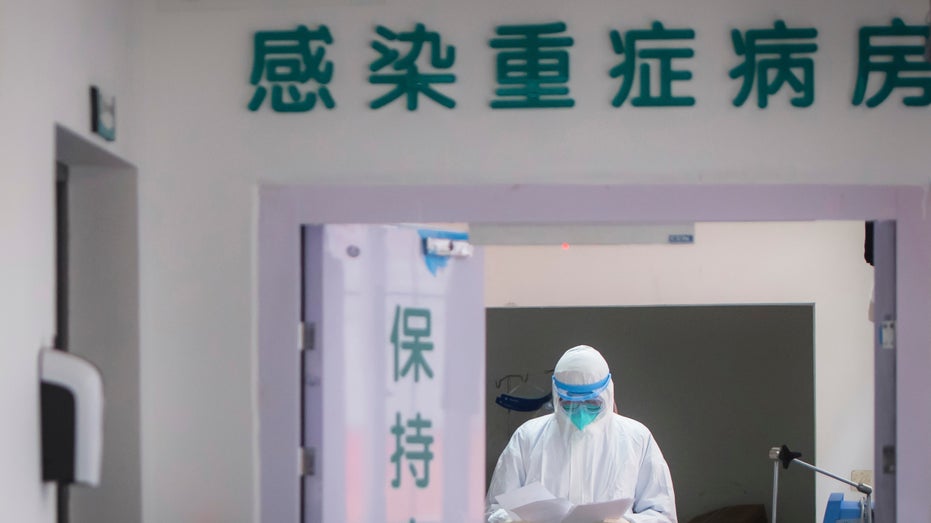China’s economy faces hurdles as Xi Jinping heads into party congress
China is facing increased COVID-19 infections, resulting in new lockdowns, a real estate crisis and high youth unemployment
Global financial system will be 'shocked' when China annexes Taiwan: Vivek Ramaswamy
Strive founder Vivek Ramaswamy discusses Paypal's new 'misinformation' policy and the threat of China invading Taiwan, on 'Varney & Co.'
BEIJING, China – This week, China's Xi Jinping is likely to solidify an unprecedented third term as General Secretary, the highest leadership position within the Communist Party of China. Yet, the country faces major structural economic problems exacerbated by Xi's flagship zero-COVID-19 policy and his relentless grip on power.
With COVID-19 cases nationwide on the rise, more than 60 towns and cities across China are currently in lockdown, confining tens of millions of people to their homes. In addition, hundreds of millions of people are subjected to regular mandatory testing and limited mobility.
| Ticker | Security | Last | Change | Change % |
|---|---|---|---|---|
| CNYA | ISHARES TRUST MSCI CHINA A | 35.84 | +0.48 | +1.37% |
| GXC | SPDR INDEX SHARES FUNDS STT STR SPDR S&P CHINA | 102.03 | +0.80 | +0.79% |
China's strict COVID-19 restrictions are not only increasingly putting pressure on social stability, but also taking a toll on the domestic economy. With major manufacturing and transportation hubs in lockdown, a real estate crisis, and the highest youth unemployment in decades, the growth rate of the world's second-largest economy is declining.
Experts agree that China will not reach its 5.5% growth rate. During Wednesday's Foreign Ministry press conference, spokesperson Mao Ning commented on China's slow growth rate, saying that "only when the pandemic is contained can the economy be stabilized."

(Xiao Yijiu/Xinhua via AP) ( )
But the country's zero-COVID-19 policy isn't the only problem compounding its current economic slowdown. After years of heavy real estate and infrastructure investment, China has run out of easy returns on investment projects.
One way to stimulate growth would be to boost domestic consumption by redistributing wealth from the big corporations to the people, in other words, by increasing wages. But analysts believe that seems too tricky for Xi for several reasons.
Wage increases could damage China's competitive advantage as a manufacturing and exporting superpower, which is already under pressure due to inflation in the U.S. and Europe caused by Russia's invasion of Ukraine.

(Huang Jingwen/Xinhua via AP / AP Newsroom)
Over the years, China has invested heavily in gaining independence by encouraging the production of high-tech products and services. But thus far, the country's labor force still lacks the skills and knowledge to steer away from producing cheap goods facilitated by low labor costs and supply-chain advantages.
Another reason that Xi is hesitant to increase wages is that he wants to maintain control of investment flows. Instead, China has experimented with so-called special purpose bonds or coupons that mainly contribute to the country's strategic goals, such as developing the high-tech sectors and the green transition.
The fact is that China is currently the largest investor worldwide in renewable energy, followed by the U.S. This is where opportunities lie for the Chinese economy to support its growth model. Foreign ministry spokesperson Mao Ning recently told reporters that "the Chinese economy has strong resilience, ample potential, . . . and the fundamentals sustaining the sound growth of the Chinese economy, in the long run, will stay unchanged." Yet, figures show that private investments in the sector have yet to take off.
A third risk is that higher wages will not lead to higher consumption. Chinese households spend a large proportion on fixed expenses such as housing, pension, and healthcare, and all three are under pressure.
China's real estate sector has been on the brink of collapse since last year, when one of the biggest property developers, Evergrande, failed to meet its financial obligations. In response, Chinese authorities did something they had failed to do years before: instead of bailing Evergrande out, they put restrictions on it and forced it to restructure its operations, thus putting severe pressure on the entire real estate sector. In response, housing prices have plummeted, evaporating billions of dollars, and leading to an ongoing mortgage boycott across the country.
Although the country's statutory pension contribution rate is one of the world's highest, it will not be enough to support the rapidly aging population. Another factor that is worrying analysts and officials is that numerous local governments have raised the alarm over depleted resources and capacity in hospitals and care homes.
Such investments in these sectors do not translate into GDP growth rates and therefore are not popular with local government officials.
The huge population wants to be acknowledged by Xi Jinping, who will soon be enjoying a third five-year term at the helm of communist China.




















